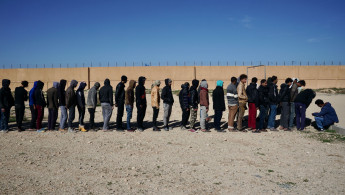UN envoy criticises EU 'blindness' on Libya migrant crisis after deadly airstrike
The EU has been accused of "blindness" towards refugees and migrants in Libya after Tuesday night's airstrike on a migrant detention centre outside Tripoli which claimed the lives of at least 53 people.
"There is a certain blindness among European countries about the situation of migrants in Libya, which has been deteriorating for months," Vincent Cochetel, UN special envoy on migration in the Mediterranean, told AFP.
"The recent fighting has created an even worse situation. It cannot be business as usual in terms of this cooperation on returns to Libya."
The Tripoli government has blamed Wednesday's pre-dawn strike, which killed at least 44 migrants and wounded more than 130, on the self-styled Libyan National Army and its foreign backers.
The LNA, led by armed group leader Khalifa Haftar, said his forces it targeted a nearby militia position but denies striking the hangar where the migrants were being held.
Cochetel said the deadly airstrikes should provoke a rethink by the European Union of the policy of returning migrants intercepted at sea to the war-torn country.
Twitter Post
|
Aid groups have blamed the tragedy in part on the EU's policy of partnering with Libyan militias to prevent migrants from crossing the Mediterranean Sea to seek a better life in Europe.
Critics of the policy say it leaves migrants at the mercy of brutal traffickers or confined in detention facilities near the front lines that often lack adequate food and water.
"We have been repeatedly saying that people should not be returned to Libya because people disappear between the points of disembarkation and the detention centres," Cochetel said.
"Some people are taken to the detention centres where they are mistreated and held arbitrarily while others end up being rented out or sold to business people."
The UN envoy said the GPS coordinates of the detention centre, a former military camp, were passed on to all parties in the conflict.
But due to the risk of collateral damage he had called for the centre to be closed down, but says "nobody listened to us".
Change in EU policy
Rights groups say migrants face horrifying abuses in Libya, which remains prey to a multitude of militias vying for control of the oil-rich country.
Their situation has worsened since Haftar launched an offensive 4 April to conquer Tripoli, the seat of the internationally-recognised Government of National Accord (GNA).
The EU's new leadership team must "renew pressure" on Libyan authorities and all parties to the conflict to end the "arbitrary detention" of migrants in Libya, Cochetel told AFP.
"We need a very visible and quick disembarkation system for people rescued at sea and for people to be held responsible for the way they are treated," the UN's special envoy said.
EU member states such as France and Italy have taken measures to boost the capacity of the Libyan coastguard, but criminal elements are still involved in the process with "total impunity," Cochetel said.
"I understand Europe's strategic interests but we have to move beyond that. Have the conflicts which are spurring people to travel to Libya been resolved?"
Agencies contributed to this report.





 Follow the Middle East's top stories in English at The New Arab on Google News
Follow the Middle East's top stories in English at The New Arab on Google News

![Israeli forces ordered bombed Gaza's Jabalia, ordering residents to leave [Getty]](/sites/default/files/styles/image_330x185/public/2176418030.jpeg?h=a5f2f23a&itok=_YGZaP1z)
